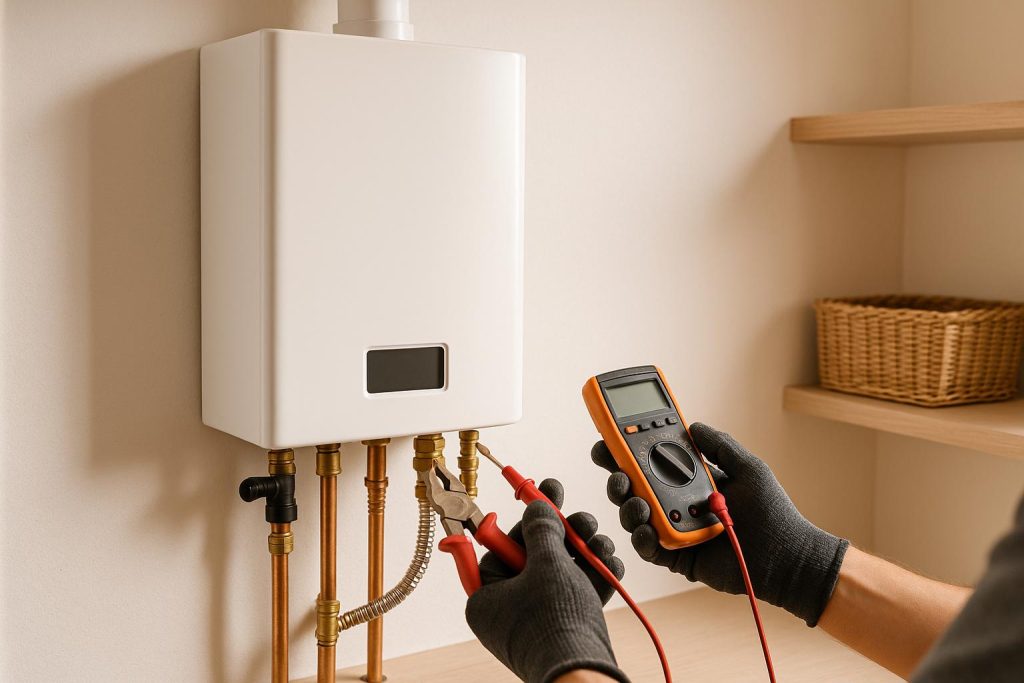Does Freon Have a Taste or Smell?
In air conditioning or refrigeration, Freon (a refrigerant) moves within a closed-loop system where it changes from gas to liquid and back to gas again and in the process remove heat from where it is not needed
In air conditioners specifically, Freon moves from the compressor to the condenser coil and then to the evaporator coil. The 3 air conditioner components are joined together using copper tubes.

Freon travels within the copper tubes and is not supposed to leak, although leaks occur. That usually happens when the coils crack.
So, how does freon smell like and can you tell if your air conditioner’s Freon is leaking just by smell?
At low concentration, a Freon leak will have no distinctive taste or smell. However, if there is a lot of the Freon leaking (high concentration), the Freon will have a slightly sweet smell. The smell can also be similar to that of nail polish, paint or paint thinner.
Having said that, I should add that perception of smell varies from person to person. For people with a weak sense of smell, Freon will largely be odorless for them. Those with a good sense of smell will detect a slightly sweet aroma at high concentrations.
It is therefore hard to detect if your air conditioner’s Freon is leaking purely by whiffing around your house. Even HVAC professionals don’t do that.
If an HVAC technician suspects that your Freon/refrigerant is leaking they will carry out tests on your AC system and not try to detect a Freon smell in the house. The tests often carried out are:
- Dye testing
- Nitrogen leak detector test
- Electronic leak detector test
Freon does not have a distinct taste. It is therefore accurate to note that if your air conditioner’s Freon is leaking, you are not likely to detect it based on smell or taste.
The main sign of a Freon/refrigerant leak is an undercooling air conditioner. When a leak happens, the refrigerant in the system will be insufficient to absorb heat from the house meaning your air conditioner will be undercooling the house.
The problem above can however also be caused by other air conditioner problems and not just a refrigerant leak.
What Does Refrigerant Leak Smell Like?

I want to start by mentioning that Freon is a refrigerant but all refrigerants are not Freon. It is the same way that Dawn is a dish soap but you can’t call all dish soaps Dawn.
What most people don’t know is that Freon is a registered trademark by DuPont. There are lots of people who do not use Freon as a refrigerant but still refer to their refrigerant as Freon.
As a matter of fact, the production and importation of Freon was banned in 2020 (United States being a signatory to the Montreal Protocol had to effect the ban on all states).
Freon being a chlorofluorocarbon (CFC) was the refrigerant of choice for many years but it was later discovered that it contributed to the depletion of the ozone layer. In fact, it is estimated that Freon is about 2000 times worse than carbon dioxide in its global warming potential (GWP).
Before Freon was discovered, ammonia among other chemicals were used as refrigerants. Although ammonia is a toxic substance, you cannot fail to notice its strong urine/sweat smell.
The Environmental Protection Agency (EPA) stopped the manufacture of air conditioners using Freon in 2010. Since ACs can last for a long term when taken care of, your current air conditioner could still be running on Freon.
Even if the manufacture of these ACs was stopped in 2010, not all the units were sold that year. You therefore need to check on your air conditioner to find out which refrigerant it uses.
If you have a central air or mini-split air conditioner, look for a label or nameplate on the outside unit. You should see the year of manufacture there as well as the type of refrigerant used.
Alternatively, you can check on the user’s manual if you still have it. Window/portable air conditioners will also have the label somewhere on them.
Freon is commonly known as R-22 or HCFC-22. If you see any of these two on the air conditioners nameplate then you can be sure that your air conditioner uses Freon.
The refrigerant that replaced R-22 (Freon) is R-410A. R-410A is a hydrofluorocarbon (HFC) and hence does not contain the dreaded chlorine. As such, it will not deplete the ozone layer. More on that in this post.
R-410A is available in several brand names like Puron, Suva, Genetron, Forane and others. However, all of them have the same properties.
At low concentration, R-410A is odorless but a vague smell of ether will be detected at large quantities (high concentration). R-410A is also non-toxic.
Air Conditioner Smells

When your air conditioner is leaking Freon or just any other refrigerant, it will be in small amounts and you are therefore not likely to smell it. That will be especially be the case if the leak is located in a properly ventilated place.
However, there are other smells associated with air conditioners that you need to know. They are:
1. Air Conditioner Smelling Like Sulfur or Rotten Eggs
Unless you indeed have rotten eggs in the house, rotten eggs smell in an air conditioner is a sign that natural gas is leaking into your air ducts. Natural gas is an odorless gas but due to its hazardous nature, gas supply companies inject it with a substance that produces the sulfur smell to make it noticeable when it leaks.
Sometimes the problem could also mean that you have a pest infestation or dead animals in your ductwork, which are producing the bad smell.
Natural gas is highly flammable and even if it doesn’t catch fire, it will reduce the oxygen levels in your blood and may result in fainting or even death.
The best thing to do when you detect a sulfur/rotten eggs smell coming from your air conditioner is to turn off gas supply to your house and contact your gas company.
2. Burning Smell from Air Conditioner
A burning smell from an air conditioner can be caused by several factors, some of which do not warrant immediate action from an HVAC technician. ACs have lots of moving parts especially in the compressor, which is often the source of the problem when there is a burning smell.
To start with, if your air conditioner has not been used for some time, it is possible for dust to collect and settle around the compressor and coils and when you turn on the unit, a burning smell will be detected for about 20 minutes as the dust burns off.
If you however notice that distinct smell of an electrical wire/component burning, you should turn off the air conditioner at once and contact an HVAC technician.
Another smell that you may notice coming from your air conditioner is a gun powder smell. A gun powder smell from you air conditioner basically means that fan motor or circuit board are burned.
Fixing such types of problems on your own is not advisable.
3. Exhaust Fumes from Air Conditioner
Hybrid air conditioners use both fossil fuels and electricity to run and hence exhaust fumes can be expected when the AC is running on gas. But why would other types of air conditioners have exhaust fumes smell?
Air conditioners have other fluids like lubricating oils which can leak into your air conditioning or heating systems and release exhaust fumes after burning.
4. Chemical Smells from Your Air Conditioner
Although the only chemical which runs in your air conditioner is the refrigerant (which we have seen is hard to detect by smell), you may at one point detect a chemical smell coming from you air conditioner.
So, what would cause your air conditioner to have a chemical smell?
To start with, air conditioners in central air systems pull air from the house using return air ducts. If there are open chemical containers around, the smell from those chemicals will be pulled up as well and when the cooled air is being released in your house, you will notice the smell.
If you have had a repair job done on your air ducts, it is not unusual to have a chemical smell coming from the air conditioner. That is normally as a result of the glues used to seal leaks in the ducts and should go away on its own after a few days.
5. Moldy/Musty Smell from Air Conditioner
When Freon or other refrigerant is inside the house, it is usually very cold since it is in its liquid state. Condensation can therefore buildup inside unit.
When the unit does not drain the moisture away, the moisture can easily enter the ductwork and result in the buildup of mold. Needless to say, mold in your air ducts will result in a musty smelly coming from your air conditioner.
This problem can also be caused by a clogged condensate drain line. When the line is unable to drain away the condensate, mold will grow inside the line and hence the smell.
Apart from the poor quality of air in your house, mold can cause respiratory infections and you should therefore contact an HVAC technician to fix the problem.
Wrap Up
In conclusion, you are not likely to notice Freon leaking from your air conditioner. This is regardless of if you are using Freon, Puron or any other refrigerant.
The best thing to do if you notice any smell coming from your air conditioner is to call an HVAC pro. It is also the same thing you should do when your air conditioner is not cooling your house properly.
There are very few air conditioners problems that can be solved by DIYs





